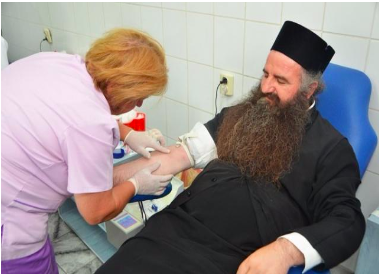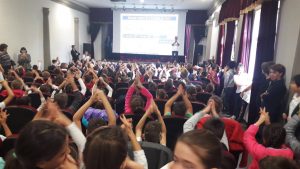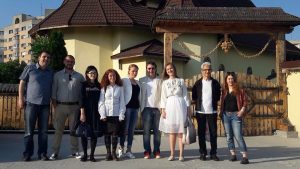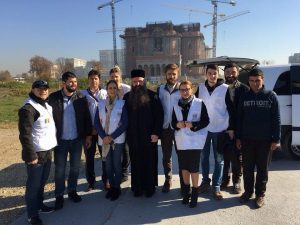The role of the religious institutions in mobilizing social good is vast. Today, we are showcasing a report brought to us by Delia Lungan, our Creative Director here at the Give Me 5 Campaign. Delia (@DeliaLungan) creates art with a sustainable and peaceful message and we thank her for bringing us this unique article.
‘Healthcare for Villages’ and Health Prevention and Education Campaigns. A Great Inspiration For The World of an Amazing Humanitarian Mission Happening in Romania.
Involvement, Kindness, Generosity and Education will change the world, making it a better place not only for today, but also for future generations.
The Romanian Orthodox Church
The Chapel of People’s Salvation Cathedral
“Healthcare for Villages” and “Health Prevention and Education” campaigns
During the 10 years of patriarchal service of His Beatitude Daniel, through the care of His Beatitude, the Romanian Orthodox Church was involved in helping those in need. Proof of this involvement are the ‘Donate blood, save a life’, ‘Healthcare for Villages’ and “Health Prevention and Education” campaigns. These represent a signal of change for the Romanian society, examples of concrete support given to the people in need.
Many young people responded to the Initiative of the Romanian Orthodox Church. They have offered to help implement projects dedicated to people in a precarious financial situation.
The first campaign launched was ‘Donate blood, save a life’. The project took shape in 2013 and was coordinated, from the beginning, by Father Archimandrite Ciprian Grădinaru from the Chapel of the Salvation Cathedral. Father Ciprian, along with the volunteers of the chapel, supported many blood donation actions.
The dynamic work done by the volunteers from Bucharest was viewed with interest by the clergy and the faithful from the entire country. As a result, the blood donation campaign spread to other dioceses and is implemented today across the entire patriarchy, many people benefiting from the kindness and generosity of the blood donors.
The second campaign that was aimed at helping the people in need was called ‘Healthcare for Villages’. The social – philanthropic campaign started in 2015, when a protocol of cooperation was signed between the Romanian Patriarchy and the Ministry of Health.
The second largest social project of the Romanian Patriarchy represented a social campaign that facilitates access to free medical care for the rural population.
Numerous editions of the ‘Healthcare for Villages’ campaign took place in many dioceses of the Romanian Patriarchate. These were attended by both doctors and faithful, all volunteers in this project.
Through the ‘Healthcare for Villages’ and the ‘Health Prevention and Education’ campaigns, conducted with the blessing of Patriarch Daniel, thousands of Romanians have been helped and informed how to improve their health.
The Rural Health Project was carried out following a collaboration protocol concluded between the Romanian Patriarchate and the Ministry of Health on 3 September 2015. It was implemented between September 12, 2015 – July 29, 2017. The beneficiaries of the 48 editions amounted 6680 people. The last action took place in Perşunari, Gura Vadului commune, Prahova County.
The Health Prevention and Education Campaign was an extension of the Healthcare for Villages Campaign (based on the Protocol of 03.09.2015). Between August 4, 2016 and October 16, 2017, 7686 beneficiaries were registered in the 35 campaign editions. The edition of Branesti, Ilfov, was the last action in the project.
For four years, the volunteers from the Chapel of the People’s Salvation Cathedral have organized hundreds of philanthropic actions, helping those in need and suffering, trying to save lives or helping children who have no chance to go to school. And their actions do not stop here. The volunteers promise to continue these actions and to remain in the service of the people.
‘Donate blood, save a life!’ campaign
Campania ‘Doneaza sange, salveaza o viata!’
The “Donate blood, save a life!” campaign, an initiative started in 2013, has become the most important blood donation campaign. To date, over nine tonnes of blood have been donated by about 19,000 donors.
In total, over 7,000 priests and seminarians donated blood. Among the donors were policemen, gendarmes and militaries. Blood donation campaigns were organized in: Bucharest, Sinaia, Ploiesti, Campina, Oradea, Constanta, Craiova, Ramnicu Valcea, Bacau, Cluj.
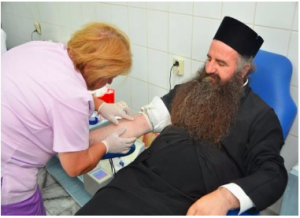 (Above photo taken from report.)
(Above photo taken from report.)
‘Healthcare for Villages’ campaign
Campania ‘Sanatate pentru Sate’
The ‘Healthcare for Villages’ campaign represents a comprehensive healthcare project run by the volunteers from the Chapel of the People’s National Cathedral. 6,680 persons from disadvantaged categories such as older people, non-insured persons at CNAS, people with disabilities and patients with chronic diseases benefited from primary health care services, in the campaign’s 48 editions performed.
At each edition of the ‘Healthcare for the Villages’ campaign, some 30 volunteers of the Salvation Cathedral were involved, out of which at least 20 were health professionals and the rest, auxiliary staff.
The objectives assumed by the volunteer doctors involved in the campaign were to identify endemic-epidemic diseases, the chronic diseases that are the leading causes of death in our country, in the isolated localities. Physicians have consulted the patients and established the diagnostics, implementing the appropriate curative treatment. Volunteers have also carried out educational programs to raise awareness and combat practices that harm the health. Some patients were counseled for specialist examinations as there was a risk of serious illnesses requiring emergency treatment and hospitalization.
The campaign brought together the following specialties: internal medicine, cardiology, pediatrics, ENT, ophthalmology, radiology and medical imaging, dentistry, diabetes, nutrition and metabolism diseases and family medicine, neurology, dermatology, urology, rheumatology, adult and pediatric psychiatry, psychology and oncology.
Cristina Costache, Clinical Training Professor, present at each action, from the start of the campaign, said: “It’s a campaign done ‘by my soul’ because nothing compares with gratitude in the eyes of those who have been treated. Nothing compares to the gathering of an old man who gladly has been consulted by a doctor. And for these people, the needy, with no material possibilities, a free medical consultation means very, very much. And we can do that. That’s why I’m here!”.
In one of the editions of March 2016, Mariana Anghel, Deputy Director of the Gimnaziale School, no. 1 in Ciorogarla said that the presence of these volunteer doctors is particularly important: “Given that there are people who have no financial means to reach a doctor in Bucharest, they do not have information and are not aware of the importance of prevention, it is extremely important that these volunteers have come to us. From what I personally find, both the elderly and the young, postpone to go to a doctor, and some of them do not even think of doing so until they are in a very serious situation. We would like the team of doctors and volunteer assistants to come back to us!”.
At each edition, volunteers collaborate with the village’s doctors, village church representatives, local authorities, school management where the event is hosted, and other people.
Father Cristian Nicolae Preda, the parish priest of the church dedicated to the Great Martyr Dimitrie, from Protoieria, the Archdiocese of Bucharest, pointed out at one of the campaign editions that where the doctor investigates and treats the sick, God brings the physical healing.
“The ‘Healthcare for Villages’ campaign is a humanitarian action, above all, because the vocation of the priest and the physician meet especially in serving the people in need. Moreover, this social action is done voluntarily, without expecting anything in return, being rewarded by God. We believe that the common sense of the two ministries, the priest and the physician, has as a manifestation the affection and the dedication to the human and bodily needs of the people. Therefore, the priest in a parish is not only a mediator between God and men, and implicitly the one who brings the soul balance, as well as a mediator between doctors and men. The priest is the one who knows both the bodily and soul sufferings, as well as the joys of the faithful in the parish.”, said Father Cristian Nicolae Preda.
The campaigns run by the volunteers from the Chapel of the People’s Salvation Cathedral are based on the principle of love for others and sacrifice. Physicians from several areas of the country such as Braşov, Piteşti or Râmnicu Sarat learned about the National Cathedral campaigns and joined the volunteer team.
Father Archimandrite Ciprian Grădinaru, the coordinator of this program, stated that “by requiring us to return to a community in which doctors and volunteer assistants have been there, it confirms that the village needs the help of doctors and nurses, but also that the population is too poor and helpless to take care of health. The ‘Healthcare for Villages’ campaign started as a pilot project in the areas administratively owned by the Archdiocese of Bucharest and proved to be effective and very necessary.”
The ‘Healthcare for Villages’ campaign is carried out with the blessing of His Beatitude Daniel, Patriarch of the Romanian Orthodox Church and under the guidance of Father Archimandrite Ciprian Grădinaru, initiator and coordinator of all the campaigns of the Chapel from the National Cathedral.
Moreover, Father Archimandrite Ciprian Grădinaru said that “there is a lot of suffering among the Romanian population, but we hope that with the help of volunteer doctors we can help the disadvantaged rural people, older people, people with low socio-economic status, disabled, undependable, with chronic illness, low educational level, social cases.”
‘Health Prevention and Education’ campaign
Campania de ‘Preventie si Educatie pentru Sanatate’
Wisdom shows that “Preventing is much easier than healing”! This is also the motto of the “Health Prevention and Education” Campaign, carried out by the volunteers of the Salvation Cathedral. Their aim is to help people, both adults and children, become aware of practices that harm physical and mental health. Educational programs are carried out by volunteers, in disadvantaged environments, in remote localities and in schools for adults, children, under aged children in detention, families with social and economic problems, newborn babies, etc. Around 7686 beneficiaries were registered in the 35 campaign editions.
The project “Health Prevention and Education” is an extension of the “Healthcare for Villages” (based on the protocol between the Romanian Patriarchy and the Ministry of Health, dated 03.09.2015) and was “born” as a result of insufficient knowledge related to ones health, mostly in rural Romania.
Specialists counseled people in various areas, such as: introducing first aid techniques, compliance with hygiene and public health rules, counseling for crime prevention, professional reconversion and social reintegration, parenting counseling and family retention. Ortho-dental prevention is a necessity given by the particular prevalence of dental complaints. Physicians have presented patients with a range of prophylactic measures that can be taken to remove, correct or stop the manifestation of causes that may lead or aggravate illnesses in the ortho-dental sphere. As a matter of fact, the fear of the dentist leads many to avoid regular checks. That is why the volunteers explained to the attendees that the visits to the doctor are not as painful as expected, and presented the ways to prevent dental caries.
The importance of mental health is often neglected and little promoted. Society is the environment in which each individual develops the skills and behaviors necessary to become a socially mature adult. The pressure of performance and social acceptance is felt by every person, in part, and sometimes the mechanism to deal with this pressure is aggressiveness or intentional harassment of others and defiance of authority, a behavior known as “bullying,” which manifests itself in both among children and adults. On the opposite side, the victims of these aggressors are isolated and have a great deal to suffer. Volunteers have tried, through their educational programs, to reduce stigma, aggression, and all forms of mental violence among patients by increasing awareness of their own emotions towards themselves and others, strengthening the child-parent bond, direct encouragement for recipients to ask for help in crisis situations, and direct training, together with the beneficiaries, of techniques useful in the management of anger and impulsive reactions.
Hygiene and public health rules are mandatory, according to the law, for all units in the public and private system, as well as for the entire population. Failure to comply with hygiene and public health rules can damage individual and collective health, sometimes generating epidemics with severe effects among nearby communities. Every individual needs to be aware of the role they play in maintaining their personal and social health, from an early age, as soon as possible. Awareness of the ease of transmission of viruses makes an important contribution to the prevention of illness. Therefore, the recipients have been exemplified and the ways in which the viruses are transmitted, how to react correctly to a sneeze, correct hand washing methods etc.
The Campaign “Health Prevention and Education” involves a lot of effort from the volunteers who are committed to meeting all requests from citizens from different parts of the country. Campaigns run by the volunteers from the People’s Salvation Cathedral are based on the principle of love for others and sacrifice. Physicians from several areas of the country such as Braşov, Piteşti or Râmnicu Sarat learned about the campaigns of the National Cathedral and wanted to join the volunteer team.
“What I am most pleased with is that we have exceeded our target at the start of the Campaign. Initially, we wanted to reach the figure of 6000 beneficiaries, but we were told that it is a large and unrealistic figure.” said Dan Pruna, the coordinator of the volunteer group from the People’s National Cathedral.
Surprisingly, around 7686 people benefited from the campaign, which started at the beginning of 2016.
“Over the course of a year or so, we have traveled to many regions of the country: Braşov, Braila, Maramureş, Prahova, Ilfov, Vrancea, Cluj. Moreover, we managed to establish another core of volunteers in Cluj, which enhance our work there. We also managed to sign a collaboration protocol with the School Inspectorate in Bucharest this year and we have a significant number of children who have been receptive to our events held through the ‘Health Prevention and Education’ campaign.
Last but not least, we had the opportunity to address people in the Jilava Penitentiary twice: the first time we organized a reunion between fathers and their children in the penitentiary on June the 1st and the second time we organized the Day of Romanian Language. Moreover, we went to the penitentiary for under aged children in Tichilesti and at the penitentiaries in Braila and Focsani, Vrancea. There are people in distress who have shown openness to our social-cultural programs and we have often adjusted our campaign agenda to suit their demands. People find out about the campaigns conducted by our group of volunteers and invite us. The feedback we have from the beneficiaries is extraordinary and it motivates us to continue!”, said Dan Pruna, the coordinator of the volunteer group from the People’s National Cathedral.
Here are some great images from Delia of those who engaged in these programs!


